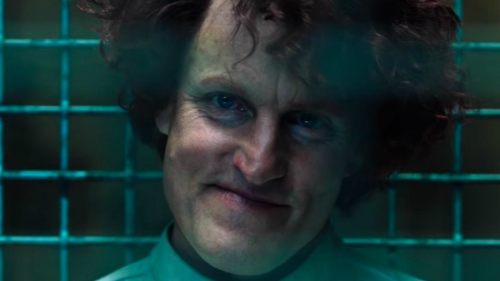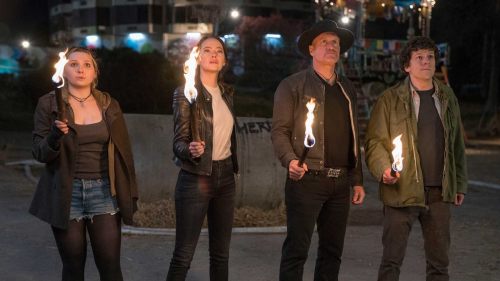THE HIGHWAYMEN Review: An Arresting Trip With Costner and Harrelson
Age becomes Kevin Costner. In The Highwaymen, he plays Frank Hamer, the former Texas Ranger called back into service in 1934 for the manhunt of his life, and he brings a sense of history that complements his character’s. With lines on his face and the beginnings of a paunch, Hamer’s glory days are behind him, but the new mission allows him to demonstrate that he can still get the job done, and so it is with Costner, who carries this saga with the steady determination and skill of a man with many years of experience playing lawmen, often in period pieces.
Playing select theaters starting Friday ahead of its Netflix debut March 29, The Highwaymen pairs Costner with an equally fine Woody Harrelson as Maney Gault, another ex-Ranger whom Hamer calls on to assist him. Grizzled and slouching, Harrelson appears to be playing even older than Costner (in reality, Gault was two years younger), and while Gault appreciates the opportunity to get back in the figurative saddle, he is somewhat less convinced than Hamer that the two of them can accomplish their mission.
That mission is no less than tracking down Bonnie and Clyde, the young bank robbers who are on the run after Bonnie affects Clyde’s escape from a prison farm in the film’s opening scene, and who have a history of gunning down policemen. The law, despite the adoption of then-new techniques, has been unable to apprehend the duo, and Texas governor Miriam “Ma” Ferguson (Kathy Bates), who has disbanded the Rangers but is under pressure to stop the crime wave, becomes convinced that putting Hamer on the criminals’ trail will give them an extra shot at success. “Ma” is given such a colorful reading by Bates, making the most of lines like “If today was a fish, I’d throw the son of a bitch back,” that you wish she turned up more often, and she gets the story off to a sprightly start.
Thereafter, The Highwaymen adopts a measured pace and an earthbound tone to present an engrossing examination of two men attempting to get back to doing what they do best. As Hamer and Gault run down leads—even though chasing a young suspect leaves them out of breath—and travel out of their jurisdiction in their quest to bring Bonnie and Clyde to justice, Costner and Harrelson enact a moving dual portrait, playing off each other with a depth of chemistry evoking years of partnership (though the two have never co-starred in a film before). Though there are several tense encounters in the course of their trek, this isn’t a gangster film concerned with gunfights. Its most powerful moments are its dialogue passages, as when Hamer encounters Clyde’s father (William Sadler, terrific in a brief role) in the latter’s garage, and a latecoming monologue in which Gault recalls a particularly bloody excursion from his past.
Despite director John Lee Hancock and screenwriter John Fusco’s own mission to set the record straight about Hamer (who is portrayed as an incompetent in Arthur Penn’s classic Bonnie and Clyde, to the point where Hamer’s survivors sued the producers), The Highwaymen is not a revisionist crime drama of the sort that underlines its own relevance to modern times. There are certainly unforced parallels to be drawn, particularly when it comes to the celebrity status Bonnie and Clyde acquired during their rampage. Hancock and Fusco make the smart decision to keep these notorious figures almost entirely offscreen; we experience them as Hamer and Gault do, via that notoriety itself, and the filmmakers immerse us in the poverty-stricken milieu from which Bonnie and Clyde sprang—and which responded by making them folk heroes. From encouraging graffiti on a water tower to a throng of admirers surrounding the couple’s car, Hamer and Gault are given repeated reminders of their quarry’s popularity, and through their travels, we witness with them a series of potent reminders of why ordinary folks might consider these cop-killers to be Robin Hoods.
Should anyone choose to make it an exhibit, The Highwaymen offers further evidence that Netflix’s offerings warrant consideration as theatrical-quality feature films. This is a handsome production, boasting rich widescreen photography by John Schwartzman, a flavorful, stirring score by Thomas Newman, and, most of all, meticulous yet subdued production design by Michael Corenblith that fully evokes a past era without fetishizing it. Similarly, The Highwaymen tells a story of people who live in a world of violence in a manner that pointedly avoids glorifying it—(SPOILER ALERT) right down to the resolution of Hamer and Gault’s hunt, which eschews the blaze-of-glory spectacle of Penn’s film; it’s blunt and brutal in a way that makes no one seem heroic.



